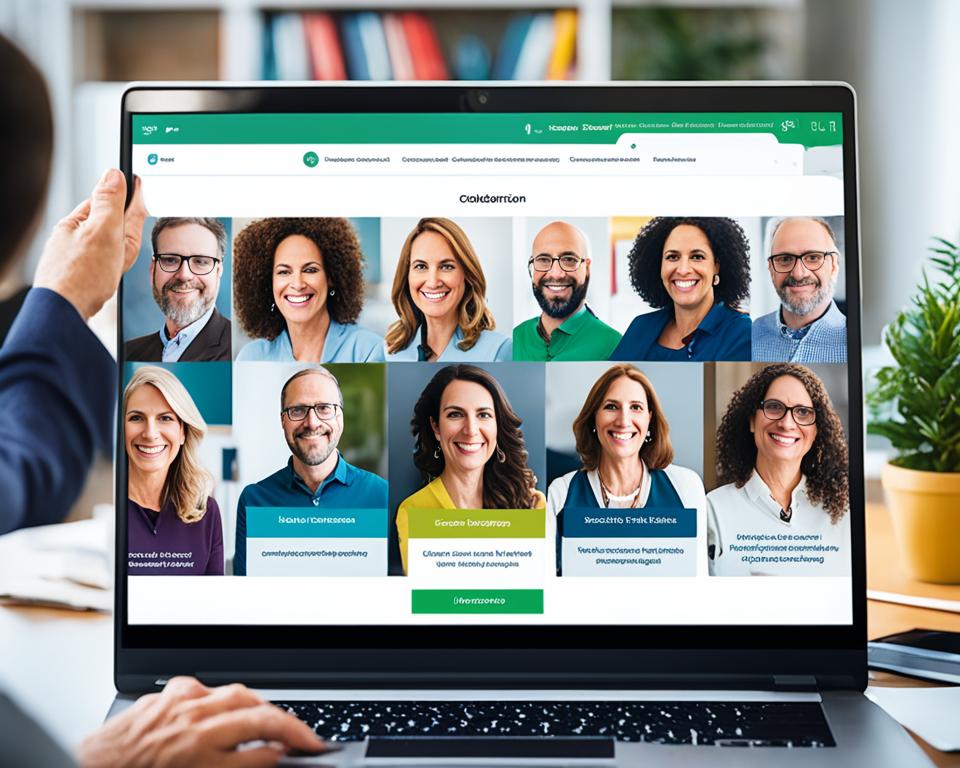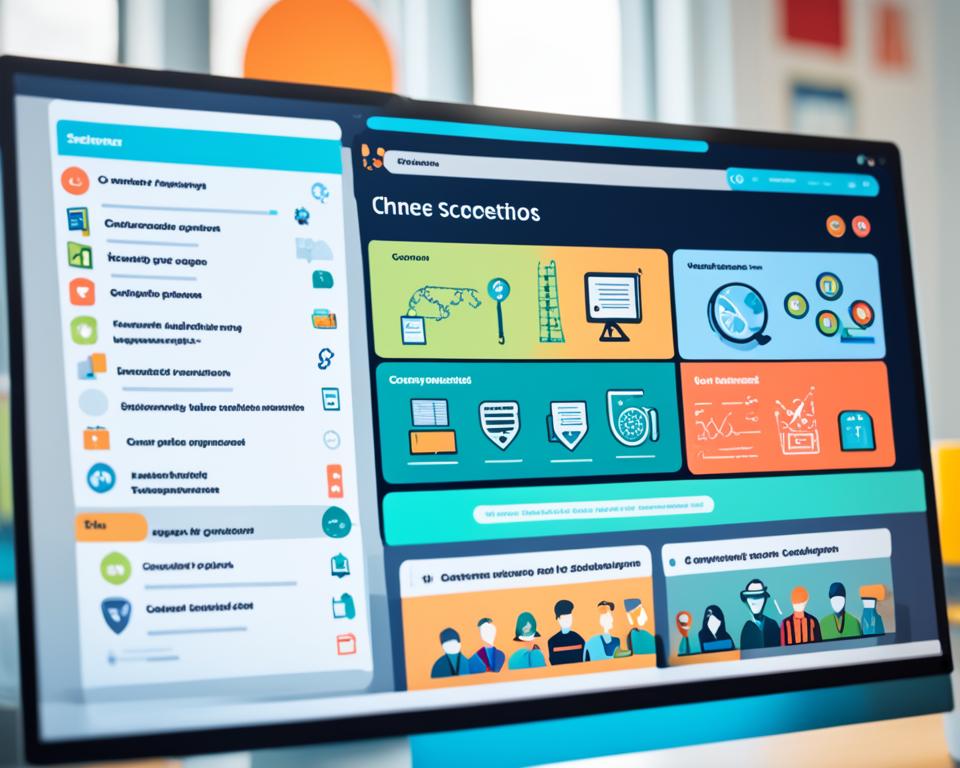Online education has become increasingly popular, especially in the wake of the COVID-19 pandemic. With the digital education industry projected to grow significantly in the coming years, educators are faced with unique challenges in the virtual classroom. From managing time effectively to fostering student engagement, there are several obstacles that need to be addressed to ensure a successful e-learning experience.
In this article, we will explore the challenges that educators encounter in online education and provide strategies to address them. From remote learning and virtual classrooms to teacher training and student engagement, we will cover a range of topics to help educators navigate the complexities of online education.
Key Takeaways:
- Online educators face challenges in time management, communication, and providing effective feedback.
- Strategies such as utilizing technology tools, enhancing student engagement, and supporting educators with training and resources can help address these challenges.
- Embracing evolving technologies and personalized learning can contribute to the future of online education.
The Time Management Challenge for Online Educators
Time management is a major challenge for online educators. Teaching from home eliminates the commute but comes with additional tasks such as moderating discussion boards, updating class websites, and responding to an increased number of emails.
Online instructors may struggle with balancing teaching tasks and other responsibilities, leading to difficulties in managing time effectively.
“Teaching from home has its perks, but it also comes with added responsibilities that can make time management challenging.”
To effectively address this challenge, online educators need to prioritize and create a structured schedule. The following strategies can help educators manage their time more efficiently:
1. Establish a Daily Routine
Creating a consistent daily routine can provide structure and help online educators manage their time effectively. Designating specific blocks of time for teaching tasks, administrative work, and personal responsibilities can help establish a sense of discipline and productivity.
2. Prioritize Tasks
Online educators often have a multitude of tasks to juggle. It is important to prioritize tasks based on urgency and importance. Breaking down tasks into smaller, manageable sections and setting realistic deadlines can help educators stay organized and focused.
3. Utilize Time Management Tools
There are numerous time management tools available to assist online educators in organizing their workload. These tools, such as project management software, task management apps, and calendar applications, can help educators stay on top of deadlines, track progress, and efficiently allocate their time.
4. Delegate and Collaborate
Online educators should consider delegating some responsibilities and collaborating with colleagues or teaching assistants whenever possible. By sharing tasks and resources, educators can lighten their workload and free up time for more critical teaching tasks.
5. Set Boundaries
It is essential for online educators to set clear boundaries between work and personal life. Designating specific work hours and creating dedicated workspace can help separate professional and personal responsibilities, enabling educators to focus and effectively manage their time.
| Time Management Strategies for Online Educators |
|---|
| Establish a daily routine |
| Prioritize tasks |
| Utilize time management tools |
| Delegate and collaborate |
| Set boundaries |
By implementing these time management strategies, online educators can overcome the challenges of balancing teaching tasks, flexibility, and additional responsibilities, ensuring more efficient and effective online education experiences.
Overcoming Communication Challenges in Online Education
Communication plays a vital role in online education, but it can present unique challenges in a virtual classroom setting. Online instructors often rely on asynchronous communication methods, such as email or message boards, which can limit real-time interaction and hinder effective understanding and response to students’ questions and concerns.
The absence of non-verbal cues further complicates the communication process, making it challenging for instructors to gauge students’ tone and emotions. Technical issues, such as poor audio quality or connectivity problems, can further impede communication and hinder the learning experience.
To address these communication challenges, educators can utilize video conferencing platforms and instant messaging apps to facilitate live communication. Video conferencing allows for real-time interaction, enabling instructors to address students’ needs promptly and facilitate a more dynamic learning environment. Instant messaging apps provide a convenient channel for quick and efficient communication, allowing students and instructors to exchange information and resolve queries in a timely manner.

By incorporating these tools into their teaching practices, educators can bridge the gap caused by asynchronous communication in the virtual classroom. Live communication via video conferencing platforms enables instructors to establish a more personal connection with students, fostering engagement and creating a sense of presence. Instant messaging apps provide an avenue for ongoing discussions, facilitating student collaboration and enhancing overall communication in the virtual learning environment.
Additionally, educators can encourage the use of clear and concise communication strategies to mitigate misunderstandings. Emphasizing the importance of effective written communication can help ensure that students’ questions and concerns are articulated clearly, enabling instructors to provide accurate and relevant responses.
Benefits of Improved Communication in the Virtual Classroom:
- Enhanced student engagement and participation
- Prompt resolution of queries and concerns
- Facilitated collaboration and peer-to-peer learning
- Establishment of a supportive and inclusive learning environment
By adopting effective communication tools and strategies, educators can create a more interactive and engaging virtual classroom environment. Improved communication fosters stronger connections between instructors and students, promoting a positive and enriched online learning experience.
Providing Effective Feedback in Online Education
Providing timely and meaningful feedback is a crucial aspect of online education. Without the benefit of synchronous communication, online educators may face challenges in delivering clear and timely feedback to their students. This can lead to lower student confidence and poorer academic performance. To address this challenge, instructors can utilize various strategies to enhance the feedback process and promote student engagement.
Using Audio or Video Formats for Feedback
One effective approach is to provide feedback in audio or video formats. Instead of relying solely on written comments, instructors can record personalized feedback that students can listen to or watch. This not only allows for a more direct and personalized approach but also enables students to better understand the tone and emphasis of the feedback provided.
Incorporating Actionable Comments
When giving feedback, it’s essential to provide actionable comments that guide students towards specific improvements. Rather than simply pointing out mistakes or areas of weakness, instructors can offer constructive suggestions and strategies for improvement. Actionable comments empower students and help them see the path to growth and development.
Involving Peer Review
Peer review is another valuable method to enhance the feedback process in online education. By incorporating peer review assignments, instructors can encourage students to provide feedback to their peers and engage in collaborative learning. Peer review not only expands students’ perspectives but also fosters a sense of community and active participation.
Effective feedback plays a vital role in enriching the online learning experience and promoting student success. By utilizing audio or video formats, incorporating actionable comments, and involving peer review, online educators can provide students with valuable insights, encourage their growth, and foster a supportive learning environment.
Strategies for Effective Time Management in Online Education
Time management is crucial for online educators to navigate the demands of their roles effectively. With the use of various apps and websites designed to streamline workflow, delegate tasks, and boost productivity, online educators can overcome time management challenges and optimize their teaching experience.
Workflow and Task Delegation Tools
One effective strategy is to utilize workflow and task delegation tools that help organize and prioritize teaching responsibilities. For example, Slack provides real-time communication and collaboration features, allowing instructors to connect with students, share resources, and streamline administrative tasks.
Trello is another valuable tool that enables educators to create visual boards, track progress, and delegate tasks to both themselves and their students. By organizing coursework, deadlines, and resources in one place, educators can stay on top of their responsibilities and ensure a smooth workflow.
Productivity Enhancement Apps
To enhance productivity, online educators can take advantage of apps that help manage time efficiently. Todoist is a popular task management app that allows educators to create to-do lists, set reminders, and prioritize assignments. With its user-friendly interface and cross-platform compatibility, Todoist keeps educators organized and focused.
Collaboration and document sharing are essential components of online education. Platforms like Google Drive provide educators with a centralized space to store and share course materials, assignments, and student work. By utilizing Google Drive’s features such as file organization, real-time editing, and seamless integration with other Google tools, educators can streamline their document management and collaboration processes.
Time Tracking and Focus Tools
To stay accountable and maintain focus, online educators can employ time tracking and focus tools. Focus Keeper is a Pomodoro technique-based app that divides work into intervals, promoting productivity and reducing distractions. By setting dedicated time slots for specific tasks, educators can optimize their work sessions and maximize efficiency.
Automating Grading and Incorporating Peer Review
Streamlining grading processes is essential for time management in online education. By leveraging technology, educators can automate grading tasks using platforms such as learning management systems (LMS) and online assessment tools. These tools provide rubric-based grading and instant feedback, saving educators valuable time.
Incorporating peer review into the assessment process is another effective time management strategy. By assigning students to provide feedback on each other’s work, educators can reduce their grading workload while promoting collaborative learning and diverse perspectives.
| App/Website | Description | |
|---|---|---|
| 1 | Slack | Real-time communication and collaboration tool |
| 2 | Trello | Task management and organization tool |
| 3 | Todoist | Task management and productivity app |
| 4 | Google Drive | Cloud storage and collaboration platform |
| 5 | Focus Keeper | Pomodoro technique-based time tracking app |
| 6 | Learning Management Systems (LMS) | Platforms for online course delivery and assessment |
| 7 | Online Assessment Tools | Tools for creating and grading online assignments and exams |
By implementing these strategies and leveraging the power of technology, online educators can better manage their time, increase productivity, and create a more efficient and fulfilling teaching experience.

Enhancing Student Engagement in Online Education
Engaging students in online education can be challenging due to the lack of face-to-face interaction. However, there are effective strategies that online educators can implement to promote student engagement and create a dynamic virtual learning environment.
One way to foster student engagement is by incorporating discussion forums. Discussion forums provide a platform for students to interact with each other, share their thoughts and perspectives, and engage in meaningful discussions related to the course content. Encouraging active participation in these forums can enhance students’ understanding of the subject matter and promote collaborative learning.
Another effective method to enhance student engagement is to encourage students to share their interests. By allowing students to connect their personal interests and experiences to the course material, educators can make the content more relatable and engaging. This can be done through assignments that allow students to explore topics of their choice or share relevant articles and resources that align with their passions.
“Discussion forums provide a platform for students to interact with each other, share their thoughts and perspectives, and engage in meaningful discussions related to the course content.”
Playing music at the start of lectures can also contribute to student engagement. Music has the power to create a positive and immersive learning environment, setting the tone for the class and capturing students’ attention from the beginning. By selecting music that complements the course theme or reflects the students’ interests, educators can create an atmosphere that motivates and engages learners.
Interactive activities play a crucial role in promoting student engagement in online education. These activities can include virtual simulations, online quizzes, polls, and group projects that require active participation from students. By incorporating interactive elements into the curriculum, educators can make the learning experience more dynamic and enjoyable, encouraging students to take an active role in their education.
Lastly, building a sense of community is essential for fostering student engagement in online education. Creating opportunities for students to connect with their peers and form relationships can enhance their motivation and sense of belonging. Educators can facilitate community building through virtual meet-ups, online networking events, or even informal discussions during class time.
| Strategies for Enhancing Student Engagement in Online Education |
|---|
| Incorporate discussion forums for interactive student exchange |
| Encourage students to share their interests and relate them to the course material |
| Play music at the start of lectures to create a positive learning environment |
| Incorporate interactive activities such as virtual simulations and online quizzes |
| Facilitate community building through virtual meet-ups and networking events |
By implementing these strategies, online educators can overcome the challenges of student engagement and create a vibrant and interactive learning environment that fosters academic growth and success.
Utilizing Technology Tools for Online Teaching
In order to enhance online teaching, it is essential for online educators to familiarize themselves with a variety of technology tools. These tools can significantly improve communication, collaboration, and engagement in the virtual classroom. By effectively utilizing technology, educators can create an interactive and impactful online learning environment.
Two popular learning platforms that facilitate communication and collaboration are Google Classroom and Microsoft Teams. These platforms allow educators to easily share resources, assignments, and announcements with students. They also provide features for real-time discussions, group projects, and virtual meetings, enabling students to actively participate in the learning process.
Another valuable technology tool for online teaching is interactive textbooks. Unlike traditional textbooks, interactive textbooks incorporate multimedia elements such as videos, animations, and quizzes. These interactive features not only enhance students’ understanding of the content but also make learning more engaging and enjoyable. Students can interact with the material in a dynamic way, reinforcing their knowledge and encouraging active learning.
In addition to interactive textbooks, online assessments can also play a crucial role in online teaching. Online assessments provide educators with immediate feedback on students’ performance and understanding. They can be in the form of quizzes, tests, or assignments, allowing educators to assess students’ progress and tailor their instruction accordingly. Furthermore, online assessments can be easily graded and provide students with instant feedback, fostering a more efficient and effective learning process.
“Technology will never replace great teachers, but technology in the hands of great teachers can be transformational.” – George Couros
Utilizing technology tools effectively is key to successful online teaching. It enables educators to overcome the challenges of virtual classrooms and create engaging and interactive learning experiences for their students. By incorporating learning platforms, interactive textbooks, and online assessments, educators can leverage technology to its fullest potential, ensuring a high-quality online education.
| Technology Tools for Online Teaching | Benefits |
|---|---|
| Learning Platforms (e.g., Google Classroom, Microsoft Teams) |
|
| Interactive Textbooks |
|
| Online Assessments |
|
Addressing Students’ Motivation in Online Education
One of the key challenges faced by online educators is ensuring student motivation in the virtual classroom. Without the physical presence and interaction that traditional classrooms offer, fostering student engagement and enthusiasm for learning can be challenging. To overcome this hurdle, instructors can focus on creating interactive and relevant learning experiences that promote active learning.
Fostering Interaction
Interactivity plays a crucial role in student motivation and engagement. By incorporating opportunities for students to interact with course content and their peers, instructors can create a sense of involvement and connection in the online learning environment. This can be achieved through activities such as group discussions, virtual breakout sessions, and collaborative projects.
Emphasizing Relevance
Relevance is essential in keeping students motivated and interested in their online education. When course materials and activities relate to real-world scenarios and practical applications, students are more likely to see the value and purpose of their learning. Instructors can achieve this by providing examples, case studies, and simulations that highlight the practical relevance of the subject matter.
Promoting Active Learning
Active learning methods encourage students to actively participate in the learning process, which can significantly boost motivation. Instructors can incorporate interactive exercises, problem-solving tasks, and hands-on activities to promote active learning. By allowing students to apply their knowledge and skills in practical situations, they become more engaged and motivated to learn.
Encouraging Application Beyond the Virtual Classroom
Providing opportunities for students to apply their knowledge and skills beyond the virtual classroom can enhance motivation and make learning more meaningful. Instructors can design assignments or projects that require students to connect their learning to real-life contexts. This can include conducting research, volunteering, or collaborating with professionals in relevant fields.
“The true delight is in the finding out rather than the knowing.” – Isaac Asimov
By adopting these strategies, online educators can effectively address students’ motivation in online education. Interactive and relevant learning experiences, coupled with active learning methods and the application of knowledge outside the virtual classroom, can foster a sense of motivation and purpose among students.
| Benefits of Addressing Student Motivation in Online Education | Strategies to Address Student Motivation in Online Education |
|---|---|
| 1. Improved retention rates | 1. Incorporating interactive activities |
| 2. Increased participation and engagement | 2. Emphasizing the relevance of course content |
| 3. Enhanced academic performance | 3. Promoting active learning methods |
| 4. Development of lifelong learning skills | 4. Encouraging application beyond the virtual classroom |
Supporting Educators with Training and Resources
Addressing the challenges faced by online educators requires providing them with the necessary support and resources. Through various training programs and online resources, educators can enhance their skills and expertise in the field of online teaching and learning. Additionally, pursuing teaching credentials or continuing education in online education equips educators with the knowledge and strategies needed to effectively overcome challenges. By investing in educator support, the education industry can ensure that online educators are equipped with the tools and knowledge to provide high-quality education in the virtual classroom.
Training Programs
Training programs offer educators the opportunity to develop new skills and gain insights into effective online teaching practices. These programs may cover topics such as designing online courses, utilizing virtual classroom technologies, fostering student engagement, and implementing assessment strategies. By participating in training programs, educators can stay updated with the latest trends and best practices in online education, enabling them to create dynamic and impactful learning experiences for their students.
Online Resources
Online resources play a crucial role in supporting educators’ professional development. These resources can include articles, blogs, webinars, podcasts, and instructional videos that provide guidance and tips on online teaching strategies, student engagement techniques, assessment methods, and more. By accessing these resources, educators can expand their knowledge base, gain new ideas, and stay informed about emerging technologies and trends in online education.
Teaching Credentials and Continuing Education
Pursuing teaching credentials or continuing education in online education can help educators enhance their qualifications in the field. These programs provide comprehensive instruction on theories, methodologies, and best practices in online teaching. By earning teaching credentials or engaging in continuing education, educators demonstrate their commitment to professional growth and staying relevant in the ever-evolving landscape of online education.

Investing in the training and resources necessary for supporting educators is essential to ensure their success and the success of online education as a whole. By providing educators with access to training programs and resources, along with opportunities for acquiring teaching credentials and continuing education, we empower them to overcome challenges, deliver high-quality online education, and create meaningful learning experiences for their students.
Embracing the Future of Online Education
As online education continues to evolve, educators need to adapt to new technologies and approaches. The future of online education holds immense potential for improving learning outcomes and providing personalized experiences for students. One of the key advancements in this field is adaptive learning, which uses data and algorithms to tailor instruction to individual students’ needs.
Adaptive learning platforms analyze students’ performance and provide targeted feedback and resources to address their specific areas of improvement. By dynamically adjusting the content and pace of instruction, adaptive learning ensures that students receive personalized support, leading to enhanced engagement and mastery of the material. This approach is particularly valuable in online education, where educators may face challenges in providing individualized attention to each student.
Personalized learning is another crucial aspect of the future of online education. This approach focuses on tailoring instruction to individual students’ interests, learning styles, and goals. With the help of technology and online resources, educators can create customized learning paths for students, allowing them to explore topics that resonate with their unique passions and abilities. Personalized learning promotes student autonomy, ownership of learning, and a deeper understanding of the subject matter.
Staying updated with emerging trends and research in online education is essential for educators to remain effective. The rapid pace at which technology is advancing requires educators to stay abreast of evolving tools and methodologies. Education conferences, webinars, and professional development programs can provide valuable insights and networking opportunities, enabling educators to learn from experts in the field and share best practices.
The future of online education holds immense promise in creating more engaging and effective learning experiences for students. By embracing technologies like adaptive learning and personalized instruction, educators can cater to students’ unique needs and foster a love for lifelong learning. As the landscape of education continues to evolve, proactive adaptation and continuous learning will be key to addressing future challenges and ensuring the success of online education.
Conclusion
Online education presents both opportunities and challenges for educators. In order to create successful e-learning experiences, educators must address the various challenges that arise in this virtual learning environment. By effectively managing their time, improving communication, providing meaningful feedback, enhancing student engagement, and leveraging technology tools, educators can overcome these challenges and deliver high-quality online education.
One of the key challenges for online educators is time management. With the flexibility that online education offers, educators often find themselves juggling multiple tasks and responsibilities. By utilizing time management strategies, such as prioritizing tasks and delegating when appropriate, educators can optimize their workflow and ensure efficient use of their time.
Communication is another crucial aspect of online education. Educators need to find ways to effectively communicate with students, both asynchronously and synchronously, in order to facilitate learning and address any concerns or questions that may arise. Utilizing video conferencing and instant messaging apps can help foster live communication and promote a sense of connectivity in the virtual classroom.
Furthermore, providing constructive and timely feedback is essential for student growth and success in online education. By utilizing audio or video formats for feedback and incorporating actionable comments, educators can ensure that students receive the guidance they need to improve their learning outcomes. Additionally, involving peer review can provide students with different perspectives and encourage active learning.
To navigate the challenges of online education successfully, educators must also focus on student engagement. By incorporating discussion forums, interactive activities, and community-building initiatives, educators can create an engaging and collaborative online learning environment. This fosters a sense of belonging and encourages students to actively participate in their learning journey.
In conclusion, with the right support, training, and continuous improvement, educators can overcome the challenges of online education and create successful e-learning experiences for their students. By addressing time management, communication, feedback, student engagement, and technology utilization, educators can adapt to the demands of virtual learning and drive positive outcomes for their students.
FAQ
What are the challenges that educators face in online education, and how can they be addressed?
Educators face challenges in time management, communication, providing effective feedback, student engagement, and technology utilization. These challenges can be addressed through strategies such as utilizing productivity tools, incorporating live communication methods, using audio or video feedback, promoting student interaction, and familiarizing themselves with technology tools.
What are the time management challenges for online educators?
Online educators face challenges in balancing teaching tasks with other responsibilities, such as moderating discussions, updating class websites, and responding to emails. Task delegation, using productivity apps, and automating grading processes can help them manage their time effectively.
How can communication challenges in online education be overcome?
Online educators can overcome communication challenges by using video conferencing and instant messaging apps to facilitate live communication with students. This helps in understanding and responding to students’ questions and concerns promptly.
How can educators provide effective feedback in online education?
Online educators can provide effective feedback by using audio or video formats, incorporating actionable comments, and involving peer review. These methods help in giving clear and timely feedback to students, enhancing their academic performance.
What are the strategies for effective time management in online education?
Educators can utilize various apps and websites designed to help with workflow, task delegation, and productivity. Examples include Slack, Trello, Todoist, and Evernote. Additionally, automating grading processes and incorporating peer review can save time and improve efficiency in providing feedback to students.
How can student engagement be enhanced in online education?
Online educators can enhance student engagement by incorporating discussion forums, encouraging students to share their interests, playing music at the start of lectures, and providing a variety of learning experiences such as small group work and whole-class activities. Building a sense of community is essential for fostering student engagement.
What technology tools can be utilized for online teaching?
Online educators should familiarize themselves with learning platforms like Google Classroom and Microsoft Teams, which facilitate communication and collaboration. Interactive textbooks and online assessments can also provide engaging learning experiences for students.
How can students’ motivation be addressed in online education?
To address students’ motivation in the virtual classroom, educators can focus on creating interactive and relevant learning experiences that promote active learning. Providing opportunities for students to engage with course content, interact with their peers, and apply their learnings outside of the virtual classroom can increase motivation and enhance their overall online learning experience.
How can educators be supported with training and resources for online education?
Educators can be supported through training programs and online resources that help them enhance their skills in online teaching and learning. Pursuing teaching credentials or continuing education in online education can also equip educators with the necessary knowledge and strategies to overcome challenges effectively.
How can educators embrace the future of online education?
Educators can embrace the future of online education by adapting to new technologies and approaches. Embracing adaptive learning and personalized learning can facilitate individualized instruction and cater to students’ unique needs. Staying updated with emerging trends and research in online education will ensure educators remain effective and ready to address future challenges.
How can online education challenges be overcome?
By addressing challenges such as time management, communication, feedback, student engagement, and technology utilization, educators can create successful e-learning experiences. With adequate support, training, and a focus on continuous improvement, educators can navigate the challenges of online education and drive positive outcomes for students.





